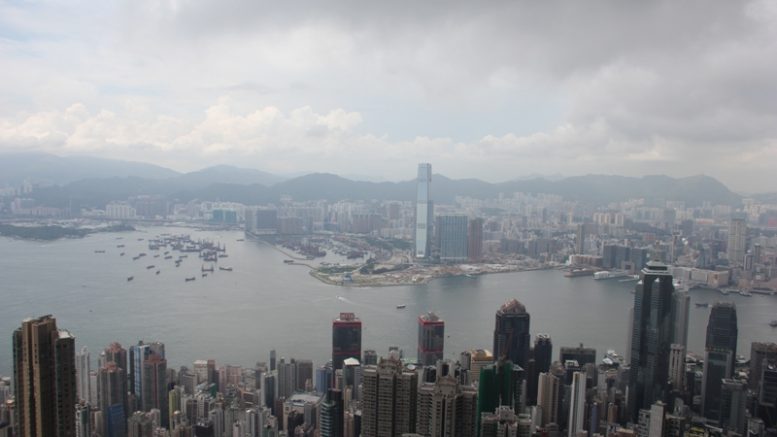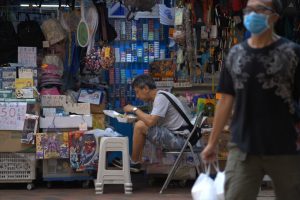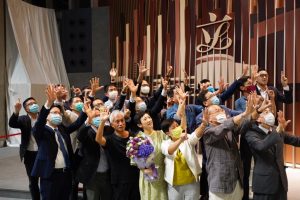By Chris Yeung —
Like almost all the weeks since June last year, the past week is a bad one for our city. We are still confronting three severe crises on the public health, socio-political and economic fronts. And they were getting worse, with the political one even uglier.
On the health front, or the Covid-19 pandemic, there is no sign of an early end of the latest outbreak. The Government imposed a week-long whole-day ban on eating in restaurants beginning Wednesday. Pictures of people taking meals at roadside, construction sites, staircases and even inside toilets went viral on social media, fuelling public anger towards the Government.
In an unprecedented and embarrassing U-turn, the Government put an end to the ban on Thursday. It took effect on Friday. Still, the damage to the already-unpopular Carrie Lam administration is done. The “dining-in saga” is yet another goal given away by the team, if there is still one, because of their incompetence, oversight and, more importantly, lack of empathy towards the difficulties of people in their daily life. This time, it is about one of our basic needs: a decent place to eat comfortably.
If the damage to the Government and the society inflicted by the dining-in ban is short-lived, the harm being done to the rights and freedoms of people guaranteed under the Basic Law in the three political sagas in the past week will be more profound and lasting.
On Tuesday, the governing council of the University of Hong Kong sacked law professor Benny Tai for misconduct, ignoring a decision by the senate, which is formed of academic staff. The senate found earlier there were not enough grounds for dismissal. Tai was convicted of public nuisance charges with a 16-month jail term last year, pending an appeal.
Soon after news of the council decision broke, the central government’s Liaison Office lauded the council for making the right decision, slamming Tai for his role in mastermining a list of anti-government protests, which includes the Umbrella Movement, the anti-extradition bill protest and the Legislative Council “35+” gameplan. China’s statement-run media has accused him of being an agent of foreign force in Hong Kong, without elaboration.
The enormity of demonising and personal attacks against Tai bearing similarities to the political purge against liberal-minded intellectuals in China’s Cultural Revolution has sent more chill to the local academia. It has stoked more fears about the erosion of academic freedom and autonomy in universities, which is an important institution that upholds the city’s culture and values.
At stake is much more than the job of Tai, but the strengths of a university with 109 years of history and, indeed, the other tertiary institutions in the city.
Chilly political wind blew on the night of Wednesday when news of the arrest of four members of the now-disbanded Studentlocalism erupted. They were held for secession and inciting secession under the national security law, the first of its kind since the law took effect on July 1. The four suspects aged 16 to 21 were said to be involved with another group, the Initiative Independence Party, which has declared its mission to turn the city into a republic.
If not for the arrests, few people would have taken notice of the launching of the new group. Many people still do not know who they are and what they plan to do from overseas. They may also feel perplexed about how a four-member group of 16 to 21 could possibly separate Hong Kong from the hinterland. But one thing looks certain. The national security law has and will be vigorously enforced. The newly-formed national security team in the Police force will bite with no mercy on what they consider as splittists.
Its timing seems to be coincidental, but the nature of it is not. The disqualification of 12 democrat aspirants from contesting the Legislative Council election, scheduled for September 6, on Thursday is the latest political purge against the democrats. The only difference is that it is the heaviest blow in direct election since it was first held in 1991. Their candidacies were declared invalid by the returning officers in the respective geographical constituency elections, who are all senior administrative officers. Citing their previous deeds and words, they were ruled to be not genuinely supporting the Basic Law and paying allegiance to the Hong Kong SAR.
Like the sacking of Benny Tai, the Liaison Office could not wait to issue a statement giving their full support to the decision of the returning officers whom cynics say did what they were told by their seniors to do.
Forget about the lengthy replies from returning officers to the now-disqualified contestants, their decision is largely expected in view of the hardened approach by Beijing to eradicate what they deem as the city’s pro-independence force – at all costs and with no leniency.
The target of purge is therefore much bigger than predicted, which is aimed to give a more severe warning to the democrats and their supporters not to gamble on the tolerance of the leadership of the ruling Chinese Communist Party.
There is little ground for hopes of a return to pragmatism, self-restraint and common sense in the Beijing leadership despite the devastating blow to the city’s socio-political and economic scene caused by the enactment of the national security law. In an important sign of policy change towards Hong Kong, major Western countries have suspended their extradition agreements with Hong Kong. They say they are unsure whether the “one country, two systems” policy remains what it was and supposed to be.
When US President Donald Trump announced an end of Hong Kong’s preferential trade status, he said, “Hong Kong will now be treated the same as mainland China.” 23 years after the 1997 changeover, the journey of Hong Kong on the path of “one country, two systems” has come to an end, at least from some Western countries’ perspective.
China has put on a brave face and played tit-for-tat against the stronger-than-expected feedback of Western countries on its hardened Hong Kong policy, only to add more oil to the fire.
Labeled by Mrs Lam and the pro-establishment camp as the opposition faction, the democrats have been given another title since the anti-extradition bill protest last year morphed into a social movement with more violence and sabotage of public facilities. They were branded as “mutual destruction faction,” (攬炒派),which could also be translated as “If we burn, you burn with us faction.”
The chain of events in the past week has deepened fears that Hong Kong is now on a slippery slope towards destruction.
Beijing thinks otherwise. They hope that the national security law could restore peace in the city in the long-run. That remains to be seen.
But the scale of destruction to the city’s fundamental strengths – autonomy, freedom and rights, institutions and ties with the world – has already proved to be alarmingly large. It is never too late for Beijing to ask themselves whether they really want Hong Kong to be the same as mainland China and, if the answer is no, what they should do.
Chris Yeung, Chief Writer of CitizenNews, an online news platform, is a veteran journalist formerly worked with the South China Morning Post and the Hong Kong Economic Journal. He writes on Greater China issues.
This is the full text of Chris Yeung’s RTHK Letter to Hong Kong broadcast on August 2.




Be the first to comment on "Hong Kong on slippery slope towards destruction"